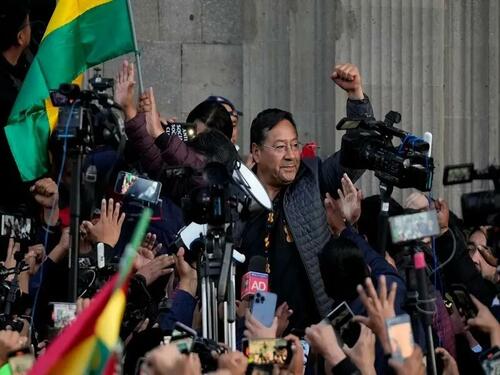There’s Much More To Bolivia’s Failed Coup Than Another CIA Regime Change Attempt
Authored by Andrew Korybko via Substack,
Many X users described Bolivia’s failed coup on Wednesday as another CIA regime change attempt, mostly due to its history of meddling in this landlocked and lithium-rich South American nation, but there’s much more to it than just that. Casually dismissing everything as a CIA plot overlooks the preexisting problems that preceded this dramatic event and oversimplifies complex dynamics. The present piece will concisely clarify what happened, why, the reason that it failed, and what might follow.
General Juan Jose Zuniga was dismissed earlier in the week after threatening to arrest former President Evo Morales if he tries running for a fourth term like the latter said that he wants to do in 2025 despite the Constitutional Court ruling late last year that it would be unconstitutional. Bolivia’s 2019 military coup was set into motion upon Morales winning a contentious fourth term after a 2016 referendum on extending term limits failed but was overruled by the Constitutional Tribunal in 2017.
For those who are interested in learning more about what happened back then, “Here’s How the Hybrid War on Bolivia Succeeded in Carrying Out Regime Change”, which was pretty much due to a significant share of the population already being preconditioned to consider his victory illegitimate. In parallel with that, the US once again co-opted its traditional allies in the armed forces there to get them to intervene against him, which led to a brief de facto dictatorship that was democratically overturned a year later.
Incumbent President Luis Arce from Morales’ “Movement for Socialism” (MAS) won a commanding victory with 55% of the vote compared to his next closest challenger who only scored 28%. The prior military-installed government folded due to the political impossibility of holding onto power under those circumstances, after which some of its members were held accountable before the law for their role in the coup. This included Jeanine Anez, who assumed the presidency during that period and is still in jail.
Over the past year, Arce and Morales had a nasty falling out over the run-up to 2025’s elections, which saw Arce being expelled from Morales’ MAS. Readers can learn more about this intra-leftist dispute here and here, but it basically boils down to personality differences, not any significant policy ones. As the ruling party’s infighting worsened, so too did the economy as its financial crisis began to climax, resulting in growing protests across the country in the immediate run-up to the failed coup.
Earlier this month, Arce was one of President Putin’s two guests of honor (the other being Zimbabwean President Emmerson Mnangagwa) at the St. Petersburg International Economic Forum, where he gave a powerful speech about multipolarity that can be read in full here. It was with their countries’ increasingly strategic partnership in mind, which importantly includes lithium and nuclear energy dimensions, that many X users assumed that the failed coup was a US-backed geopolitical revenge plot.
Nevertheless, the economic-financial and political (specifically intra-leftist) tensions that preceded it show that this interpretation isn’t all that accurate even though the US would have gained had the regime change succeeded, such as if the new authorities radically altered their country’s policies. Moreover, the timing suggests that this was an impromptu personal putsch by Zuniga after he was dismissed earlier in the week, not something that he and the CIA had been cooking up for a while.
After all, Arce personally confronted Zuniga in the presidential palace and convinced his comrades to call off the coup, which coincided with him and Morales putting aside their differences for the greater national good to call on their compatriots to mobilize in support of the government. The coup therefore failed precisely because the armed forces hadn’t colluded with the CIA in any meaningful way, nor did that agency precondition the public to support this latest regime change like they did the 2019 one.
That’s not to say that there wasn’t any US trace whatsoever at all in what happened, which might be discovered during the ongoing investigation, but just that it would have only been opportunistic at most and not part of a plot that they seriously invested in far ahead of time. As for what might unfold in the aftermath, it’s possible that Arce and Morales might reconcile or at least reduce the intensity of their rivalry, all with a view towards making next year’s elections as uncontroversial as possible.
Zuniga’s scandalous claim in the aftermath of the failed coup that Arce had earlier told him to stage some drama in order to boost his popularity amidst the country’s converging crises likely isn’t credible, but it could still have the effect of exacerbating tensions between those two. Not only that, but some of the electorate might also be influenced by what he said too, which could make some of them sour on MAS ahead of the next vote and thus potentially give a boost to their right-wing rivals.
The new socio-political situation could more easily be exploited by the CIA to facilitate any speculatively subsequent efforts to seriously carry out a coup ahead of or during next year’s elections in the event that Morales still decides to run in contravention of last year’s Constitutional Court ruling. This insight suggests that while many X users are arguably crying wolf about the CIA’s role in the latest events, this might actually end up becoming a self-fulfilling prophecy by sometime next year if Bolivia isn’t careful.
Tyler Durden
Thu, 06/27/2024 – 10:30
via ZeroHedge News https://ift.tt/C7dLPjs Tyler Durden
